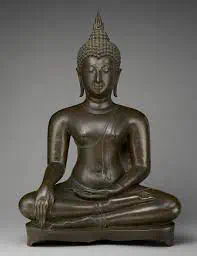 Image credit: Encyclopedia Brittanica
Image credit: Encyclopedia Brittanica
Abstract
A central Buddhist claim is that having desires causes suffering. While this tenet draws from the belief that an acute desire state is more momentarily aversive than a no-desire state, the efficacy of this belief has yet to be comprehensively examined. To empirically investigate this claim, we furnished data from two experience sampling studies across USA/Canadian (N = 101; 3224 observations) and Japanese cultures (N = 237; 8497 observations). We compared states of acute desire with states of no desire regarding momentary happiness. We then tested, in an additional step, whether acute desires at greater conflict with personal goals were associated with even lower levels of momentary happiness. Findings were consistent across studies, with participants experiencing greater momentary happiness when not experiencing a desire compared to experiencing acute desire. Also, the greater the desire conflicted with important goals the lower the momentary happiness. The present findings support a key basis of the Buddhist belief that having desires causes suffering, showing acute desire states on average to be more aversive than no desire states.